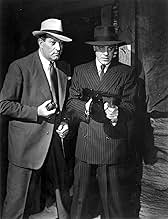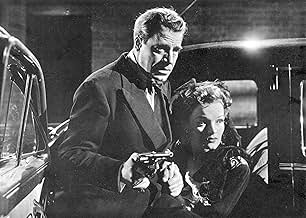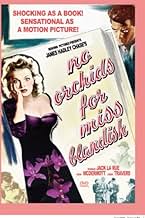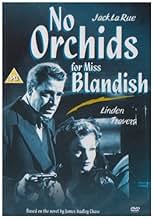अपनी भाषा में प्लॉट जोड़ेंJohn Blandish is worth $100 million. His heiress daughter is soon to be wed to Foster Harvey, who believes she's a cold, unfeeling woman, despite loving her. Her cold emotional state is in l... सभी पढ़ेंJohn Blandish is worth $100 million. His heiress daughter is soon to be wed to Foster Harvey, who believes she's a cold, unfeeling woman, despite loving her. Her cold emotional state is in large part due to leading a restricted life. A low level thug named Johnny overhears their ... सभी पढ़ेंJohn Blandish is worth $100 million. His heiress daughter is soon to be wed to Foster Harvey, who believes she's a cold, unfeeling woman, despite loving her. Her cold emotional state is in large part due to leading a restricted life. A low level thug named Johnny overhears their secret wedding night plans, and peddles the idea of robbing her of the $100,000 worth of d... सभी पढ़ें
- निर्देशक
- लेखक
- स्टार
- Doc
- (as Macdonald Parke)
- Ma Grisson
- (as Lilly Molnar)
- Riley
- (as Richard Nelson)
फ़ीचर्ड समीक्षाएं
Miss Blandish is a young lady whose father is immensely wealthy. Additionally, her diamonds have caught the eyes of some petty thugs who are planning on robbing her. This robbery turns out to be super- vicious and in the process, two of the robbers are killed. The remaining crook is a swell guy--who not only plans on taking the diamonds but raping Blandish! However, just before he can complete this vicious act, another gang (headed by Slim---played by Jack LaRue) takes the diamonds and kills the remaining thug. At first, this second gang plans on keeping the diamonds and ransoming the woman, but Slim falls for the lady and soon decides to not only keep her for himself but return the jewels! This, of course, doesn't sit well with the gang and you know it's only a matter of time before they make their move.
This is an incredibly violent film for the time. Not only is the attempted rape heavily implied, but the very end is really, really violent--and fortunately does NOT give way to sentiment. Overall, a very gritty film with great gangster dialog and lots to appreciate.
By the way, one reviewer complained how bad the accents were, as the cast was mostly British and they were pretending to be Americans. Well, I thought this was barely noticeable most of the time and didn't think this impaired the film at all. Sure, a few of the attempts were downright silly...but don't take away from the great noir plot, atmosphere and horrifyingly realistic violence. Just my two-cents worth.
Violent and (for it's time) sexually suggestive, lurid and melodramatic, nothing St John Clowe's movie contained pleased critics more happy with a realistic tradition of filmmaking, or middle-class literary adaptations for discriminating audiences. In retrospect the categorisation of No Orchids For Miss Blandish seems less problematical. Neither sophisticated literary screen transposition nor completely convincing gangster piece, laced with titillation, and with roots in trash culture, These days the movie is better seen as a landmark of British crime exploitation cinema.
At its heart lays a love story: that between Slim Grisson and Miss Blandish. It's a tragic tale too; not just because of the end which awaits the couple, but also in that Grisson is shown as being a fervent, secret admirer of the heiress from the very first scene (his distinctive double dice emblem on the card accompanying flowers) and so, ultimately, is just as much a victim of events as she. His tragedy is that he soon finds himself overseeing the kidnapping of the woman he loves, while Miss Blandish has the misfortune of falling for someone entirely unsuitable, socially or morally.
But without the sexual experience he brings she would, it seems, be condemned to eternal frigidity. It is no accident that, early on, her fiancé refers to the "ice in her veins" which needs 'melting'. Indeed one of the many things critics found unacceptable in the movie was the depiction of a woman's sexual awakening, particularly when tied to a liaison out of her class - something miles away from the usual Noel Coward-type drawing room infatuation. It's a scenario helped by some sensitive direction by St John Clowe, in a work characterised over all by some fluid camera-work.
Some have criticised the director for clumsiness, but I can't see it. To give a standout example: although we know Grisson is 'stuck' on the heiress, nothing is said between them, except for a barely perceptible nod at her by the hoodlum after their first shock meeting. At a crucial moment later St John Clowe has Grisson, clearly thinking of the woman, walk slowly up his nightclub stairs, a fairly long crane shot. His impassive face is briefly superimposed onto hers. Then in the love scene which follows she leaves him, wavers, and comes back after a tense delay - events mostly off-screen. We still do not see them together, merely (for the second time) some orchids, and his words of relief spoken over the held flower shot. For a film so explicit elsewhere, the restraint and sensitivity of direction here is striking.
As Slim Grisson, Jack La Rue is impressive; more so when one remembers that it is almost half an hour before he is first seen on screen at all. A performance over-indebted to George Raft maybe - his habitual dice throwing recalling the American star's famous coin-tossing trademark - but still touching as a love-lorn thug and whose regular lack of expression and stolid soulfulness says more than any amount of mugging could do. As Miss Blandish, Linden Travers has attracted good words, too.
Others in the cast, even allowing for the variable American accents, are admittedly less strong. Ma Grisson (Lilli Molnar), who starts out, Ma Barker-fashion, as the leader of the gang, is less menacing that one might have wished; 'Doc' the Sydney Greenstreet-type among the supporting cast is too much of a stereotype to be convincing. However, mention ought to be made of Walter Crisham's Eddie, Grisson's frightening henchman, a very intimidating and malevolent presence. While some aspects of No Orchids For Miss Blandish have been ridiculed, the budget was obviously quite a reasonable one; the nightclub fairly expansive and convincing for instance, allowing the director a chance for multiple set-ups.
Of course the club, Grisson, and his followers are a world away from Miss Blandish's previous social circle. In a way characteristic of British noir and thrillers, the film has a firm idea of class; not only in the separation of crooks and toffs, but upstairs and downstairs (the working class lovers overhearing the conversation of their betters from the basement, at the start), as well. Even the underworld has its social structure, one which the 'success' of the Grisson gang is contrasted to the smaller group doing the initial kidnapping. Only love, it seems, can cross these boundaries, but then such romance is fraught with risk. For Miss Blandish, her new relationship brings 'freedom', this from the "first man I've ever met" - a slight emphasis on 'man' when she speaks, implying the anaemia of the class she has just rejected.
To those who wish to discover what all the fuss was about, I can say that the film may be variable, but entertaining and memorable. It's certainly an important document of Britain's cinematic underbelly. No plaudits for Miss Blandish perhaps, but no outright dismissal here either.
Then, midway through the film, action stops as the picture changes from an action melodrama to a romancer, and the fast pace comes to a halt. I did not notice much chemistry between the principals, Jack LaRue (in a Bogart role) and Linden Travers (in a role somewhere between Ingrid Bergman and Claire Trevor), although she got the better of him in the acting department. Larue, for his part, has a great baleful stare, which comprises most of his acting technique. Speaking of acting, it was very uneven among the rest of the cast, however there were American equivalents of Sidney Greenstreet, Leo Gorcey, Mike Mazurki and Dan Duryea.
Did I mention this was a fascinating picture? Well, it certainly is and if it comes on, don't miss it. It is like a Monogram Studio feature but with major studio production values. Lovely background music by George Melachrino helps, but he wrote a couple of clinkers as night club numbers which are forgettable. In short, it is very worth seeing so you can compare American and UK gangster movies.
P.S. When was the last time you saw a hit-man wearing a bow-tie?
The original novel had been judged unfilmable by Hollywood, but the Poverty Row studio Renown set out to prove the moguls wrong. The resultant outcry led Harold Wilson, a future premier who was the government minister responsible for films, to declare at an industry banquet- to loud applause- that he was glad there were "no Oscars for Miss Blandish".
The fuss probably killed the career of Linden Travers, who had been in pictures since the mid-1930s but made no more appearances after 1949, dying 52 years later. Neither did its helmer, St John L Clowes, ever direct again. Interestingly, as far as I know the picture to this day has never appeared on British TV.
क्या आपको पता है
- ट्रिवियाThe film caused huge controversy in the UK after it was passed with an uncut "A" rating on account of the violence and rape implied in the story, leading to critic Dilys Powell stating that the film be "branded with a 'D' certificate for disgusting". This led to various councils banning the film completely and politicians demanding an investigation into the running of the BBFC. Censor Sir Sidney Harris was forced to issue an apology for having "failed to protect the public".
- भाव
Eddie Schultz: I never count my chickens till I've wrung their necks.
- कनेक्शनFeatured in Empire of the Censors (1995)
टॉप पसंद
- How long is No Orchids for Miss Blandish?Alexa द्वारा संचालित
विवरण
- चलने की अवधि1 घंटा 42 मिनट
- रंग
- पक्ष अनुपात
- 1.33 : 1
इस पेज में योगदान दें




























